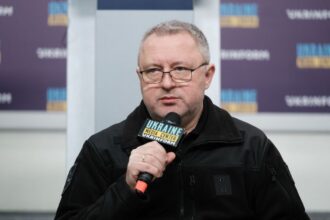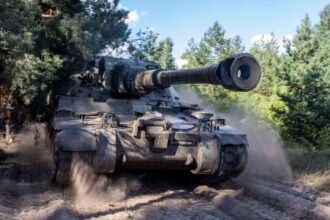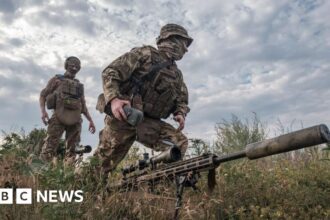The images of a year ago were shocking.
It felt like a turning-point, with Israel still reeling after the worst terrorist attacks in its history, and Gaza already under a devastating bombardment.
The Israel-Palestine Conflict, which had been largely absent on our screens for many years, has suddenly exploded into view.
It seemed to catch everyone off guard. Jake Sullivan, the US National Security Advisor, had declared a week prior to the attacks that “the Middle East region has been quieter than it has ever been in 20 years.”
One year later, the region is on fire.
More than 41,000 Palestinians have died. Gaza has been displaced by two million people. Another 600 Palestinians were killed in the West Bank. In Lebanon, a further one million people have been displaced with more than 2,000 deaths.
On that first day, Israel lost more than 1,200 soldiers. Israel has since lost 350 soldiers in Gaza. Two hundred thousand Israelis were forced to leave their homes near Gaza and along the volatile northern border of Lebanon. Hezbollah’s rockets have killed around 50 soldiers and civilians.
Others have joined in the fight across the Middle East. The US has been unable to stop the crisis from escalating despite its persistent efforts, which included presidential visits, countless missions diplomatic and the deployment vast military resources. From far away, rockets were fired in Yemen and Iraq.
Israel and Iran, mortal enemies, have also exchanged blows. And more are almost certain to follow.
Washington has never looked more influential.
As the conflict spread and metastasized, its origins faded into the background, like a car accident in the rearview mirror of a juggernaut speeding towards bigger disasters.
Media reports on the Middle East have almost completely forgotten the lives of Gazans before and after the 7th of October.
Some Israelis who were affected by that terrible day and whose lives were turned around are also feeling neglected.
Yehuda Kohn, father of Nimrod Cohen the hostage, told Israel’s Kan News last week: “We were pushed aside.” Mr Cohen said that he held Mr Netanyahu accountable for a “pointless conflict” which pitted all of our enemies against us.
“He is doing all he can, with great success to turn the event on October 7 into a small event,” he said.
Not all Israelis agree with Mr Cohen’s perspective. Many Israelis now see the Hamas attack of a year earlier as the beginning of a larger campaign by Israel’s opponents to destroy the Jewish State.
Israel’s response – including exploding pagers and targeted assassinations – has helped restore some of the confidence that the country had lost a year earlier.
Last week, Mr Netanyahu confidently stated that Israel could reach anywhere in the Middle East.
After October 7, the prime minister’s poll rating was at its lowest for several months. He can now see them rising again. Maybe a license for more daring action?
Where is it all heading?
Simon Gass, Britain’s former ambassador to Iran told the BBC’s Today Podcast Thursday that “none of us knows when the music will stop and where everyone will be at that time.”
The US is still engaged, even if Gen. Michael Kurilla’s visit to Israel as the head of US Central Command (Centcom), feels more like a crisis management exercise than a diplomatic off-ramp exploration.
The presidential election is just four weeks away, and the Middle East is more political toxic than ever. This doesn’t seem like a time for bold new American initiatives.
The immediate challenge for now is to prevent a larger regional conflagration.
Israel’s allies believe that it has the right, and even the duty, to respond to the ballistic missile attack last week by Iran.
Netanyahu has promised a harsh reaction even though no Israelis were killed and Iran seemed to be targeting military and intelligence targets.
After weeks of tactical success, Israel’s Prime Minister seems to harbour grandiose ambitions.
In a direct speech to the Iranian people he hinted at a regime change in Tehran. “When Iran is free, which will happen sooner than people think,” he said, “everything will be different.”
Some observers found his rhetoric reminiscent of the arguments made by American neoconservatives leading up to the US invasion of Iraq in March 2003.
Despite the dangers of the moment, fragile guardrails still exist.
The Iranian regime may wish for a world free of Israel, but they know that they are too weak to fight the only superpower in the region, especially when Hezbollah, Hamas, and other allies of the “axis” of resistance, are being defeated.
Israel, which would love to be rid of the Iranian threat, knows that despite recent successes, it cannot do so alone.
Joe Biden and Kamala Harris, his vice-president, do not want to see a regime change.
Donald Trump, when he was poised to attack Iran after Tehran shot down a US spy drone in June 2019, backed down at last minute (although he ordered the assassination a top Iranian General, Qasem Solimani, seven month later).
Few could have imagined a year earlier that the Middle East would be heading towards its most perilous time in decades.
Looking back at the past year, it seems that it followed a horrible logic.
The policy makers and the rest of the public are struggling to keep pace with the events unfolding at a rapid pace.
As the conflict in Gaza continues to rage, the talk of a “day after”, i.e. how Gaza will be rehabilitated, and governed, when the fighting ends, has either ceased or been drowned by the noise of a wider conflict.
Any meaningful discussion about a solution to Israel’s conflict against the Palestinians has also been ruled out. This is the conflict that brought us here.
Diplomacy could get another chance when Israel feels that it has done enough damage against Hamas and Hezbollah.
But at the moment, it feels like a long way away.
BBC InDepth, the new website and app, will feature the best analysis from our top journalists. We’ll be bringing you new perspectives that challenge assumptions and deep reporting on major issues to help make sense of an increasingly complex world. We’ll also be showcasing some of the most thought-provoking content on BBC Sounds and iPlayer. We’re starting out small but we have big plans. Please let us know what you think by clicking the button below.
Read More @ www.bbc.com




